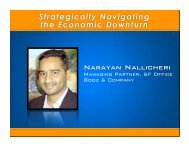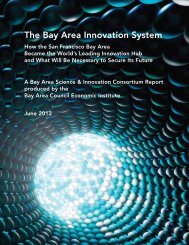PDF: 2962 pages, 5.2 MB - Bay Area Council Economic Institute
PDF: 2962 pages, 5.2 MB - Bay Area Council Economic Institute
PDF: 2962 pages, 5.2 MB - Bay Area Council Economic Institute
Create successful ePaper yourself
Turn your PDF publications into a flip-book with our unique Google optimized e-Paper software.
Semiconductors<br />
of sunshine a year and solar doesn’t require infrastructure”—as well as in the mobile communications<br />
space—“You’ve got farmers out in the fields on their cell phones searching for the markets<br />
with the best prices for their crops, meanwhile no one in the village has a landline phone.”<br />
SanDisk Corp., founded in 1988, invented flash memory storage cards and is a leading<br />
manufacturer and seller of storage cards and flash drives for digital cameras, phones<br />
and audio/video players; plug-in USB memory drives for computers; and a line of<br />
lower-cost MP3 players that compete with Apple’s iPod. It has been steadily ramping up its<br />
presence in India (in addition to Japan, Israel and Scotland) since 2004, following growth in<br />
emerging consumer markets for mobile phones and consumer electronics. SanDisk president<br />
and chief operating officer Sanjay Mehrotra, whose background includes B.S. and M.S. degrees in<br />
electrical engineering and computer science from UC Berkeley, has led the expansion.<br />
In January 2004, SanDisk began selling its full line of storage, media, and wi-fi cards, as well as<br />
USB memory drives in New Delhi and Mumbai. In February 2006, the firm opened its India<br />
Device Design Center in Bangalore with 10 engineers, in addition to employing another 50<br />
engineers through third-party vendors such as Wipro.<br />
Like other Silicon Valley companies, SanDisk has grown its presence in India in order to access<br />
specialized technical talent for global growth and to be closer to evolving needs and trends in<br />
one of its largest potential markets. Global cell phone and digital consumer device sales continue<br />
to grow dramatically, and Indian consumers have been a particularly strong market for memory<br />
devices to archive music, movies and personal photos.<br />
In April 2008, SanDisk announced new distributor partnerships to take its retail reach beyond 15,000<br />
storefronts in major cities. It signed with Ingram Micro to sell camera and phone flash memory cards<br />
through 70 vendors in 28 Indian states, reaching an estimated 12,000 retail customers.<br />
Indian entrepreneur Rajeev Madhavan founded Cupertino-based electronic design automation<br />
(EDA) developer Magma Design Automation in 1997. Madhavan began his<br />
career with Bell North Research (BNR), an R&D unit of Nortel Networks, in Ottawa,<br />
where he began writing his own EDA tools to help with design projects. In 1991, he transferred<br />
to Silicon Valley to work for Cadence Design Systems as a BNR engineer.<br />
In 1992, Madhavan jumped from Cadence, to join with Vinod Agarwal (now at SemIndia) and<br />
Michael Howells in co-founding LogicVision. He jumped again in 1994, to found Ambit Design<br />
Systems with $750,000 from a group of angel investors, this time making synthesis tools to<br />
compete directly with Synopsys. Cadence bought Ambit in 1998 for $260 million, but by then<br />
Madhavan had already left and raised $2.5 million from another group of angels—most notably<br />
Sun co-founder and Cisco senior executive Andy Bechtolsheim—to launch Magma. At that<br />
point Madhavan was 31 years old.<br />
Magma had, by 2003, grown organically and through acquisitions to be the fourth largest EDA<br />
software developer, behind Cadence, Synopsys and Oregon-based Mentor Graphics. The same<br />
year, Wipro Ltd. licensed the company’s Blast Fusion integrated tool suite for use in its systemon-a-chip<br />
(SoC) designs. KPIT Cummins followed suit in 2005. Many of Magma’s established<br />
111








